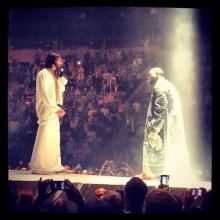Daniel White Hodge
MUSIC IS MY safe space. When all hell is breaking out, I can put in my AirPods and turn on part of the soundtrack of my life and reset. The pandemic created a chronic hell that illuminated oppressive forces that have existed for centuries. Music became even more essential for my survival.
I am a Black clergywoman who is clear that “my emancipation doesn’t fit” many people’s equation. Let me say that another way: My authentic expression of self makes some people uncomfortable. My unapologetic expression of womanist Blackness often sheds light in the shadows of a corrupt world.
I won’t pretend that I have always felt free to be me. It took a pandemic to give space to be reminded by theologian and prophet Lauryn Hill that “deep in my heart, the answer, it was in me.” Hill’s lyrics and very existence compelled me to “[make] up my mind to define my own destiny.”
Some consider Hill to be one of the greatest lyricists of all time. An eight-time Grammy winner (with 19 nominations), she sings, raps, and acts. She is hip-hop royalty. In the ’90s, I wanted to be her. She wore the dopest locked hair style, had the most beautiful brown skin, and expressed her Blackness with boldness and class. She had, and still has, a lyrical flow that men and women couldn’t ignore. She was fly. (Translated as cool, sexy, smart, and stylish.)
Her industry-shaking debut solo album The Miseducation of Lauryn Hill, released in August 1998, will stand the test of time. Hill speaks truth in ways that penetrate the soul. I was a young mother when the album came out. She articulated things that only a Black woman could identify with. She spoke of the tension and beauty of having a child when society was telling her that motherhood and a career couldn’t coexist. She sang and rapped about self-respect, love gained, and love lost. This album is life. This album ministers. This album is sacred.
On the opening night of the Yeezus Tour, multi-platinum, Grammy award-winning rapper Kanye West brought out an actor to portray Jesus during his concert in Seattle. Most of the time when I see "White Jesus" depicted, I don't get offended because I don't find it to be historically accurate. But between this and the title and theme of Kanye's last album, Yeezus, I was initially fed up. His antics were disrespectful, offensive, and just plain unnecessary.
Before I began to write this post I searched for concert footage of the event, but I stumbled upon an interview Kanye had with Wild 94, a hit music station in San Francisco. During the interview, which was done a few days after his Seattle performance, he was given the opportunity to explain his motives behind bringing out Jesus.
"We do plays all the time. People play Jesus,” West said. “You know what’s awesome about Christianity is we’re allowed to portray God. It’s a painting, it’s a sculpture, it’s a moving opera, it’s a play, it’s a message. God knows where my heart is at.”
Then came the comment that changed the entire direction of this post:
“One of the things that I really wanted to get across is that you can have a relationship with Jesus. That you can talk to Jesus. This is the way I express it.”

